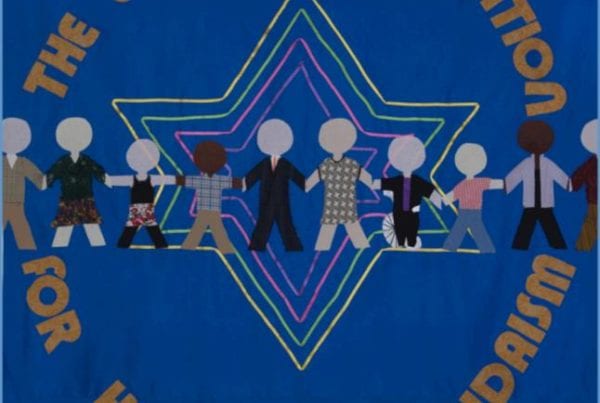Integrity
Dahlia K. Remler
Rosh Hashanah 2012
Early in graduate school, I made an appointment to meet a fellow student in our departmental library at its closing time, 5pm. At ten to five, I arrived outside the library only to see a library staff member lock the door, preventing entry. I pounded on the door. When she eventually opened it, I was self-righteously angry at her statement that one could not check anything out after 4:45. To me, by posting a sign saying the library is open until 5pm but locking it 10 minutes earlier, the library staff showed its lack of integrity.
This unfortunate episode was characteristic of me: Over an unimportant issue, I engendered ill will in someone with whom I would have to work for some time. Referring to such episodes, I have often said, only half-jokingly, that I have a pathological devotion to truth. While I mean it as a criticism of myself in these instances, I am proud of it in others.
So when our Rabbi asked me to speak about integrity, I enthusiastically launched into a speech about honesty, which I instinctively equated with integrity. The key to integrity, I said, is admitting mistakes and weaknesses to oneself and others. “I didn’t give you the time you deserved.” “I started this project without getting critical information.” “I didn’t pay attention to what you said.” Without that kind of honesty, one never fixes anything.
The worst is not even consciously lying, but rather being oblivious to the truth, automatically saying and even thinking what suits best. I recall a certain administrator who, whenever hindsight made one of his decisions look bad, would attribute the decisions to someone else. “Unfortunately, Anne—or David or Marisa—recommended we start that disastrous program.” He fooled some but others knew he lacked integrity.
I have twenty years’ experience of teaching in higher education, most recently eight years as a professor at the School of Public Affairs at Baruch College in the City University of New York. I most often teach subjects like research methods, microeconomics and statistics. In my experience, the biggest red flags are students who react to being shown their mistakes by saying, “I understood that.” If you don’t recognize your lack of understanding, you’ll never fix it.
So obsessed with honesty am I that I will forgive almost anything so long as the transgressors admit their mistakes and weaknesses. But, almost as soon as I started talking to Rabbi Peter about integrity, another possible aspect of integrity popped into my head, one I often lack: reliability. I thought of some past co-authors, people I had promised work to but delivered much later than promised—or in some cases, not delivered at all. Even Peter had the same experience with drafts of this talk. I imagine those co-authors don’t think that my mea culpas—admitting my mistakes—make me someone of integrity, or at least not as much integrity as sticking to my promises would have.
I set off to ask others how they would define integrity. One friend said, “doing what you say you are going to do, within reasonable socially-defined norms of what on time mean.” Ouch! Or at least ouch in one arena of my life.
So, what is integrity? The word’s origins lie in integer—being whole. That is still the meaning of integrity in engineering and data: the whole—the building, the dataset—is intact. The term integrity in ethics stems from one’s actions and words being consistent with one’s own moral codes.
Such integrity is a big deal in Humanistic Judaism: “say what we mean and mean what we say.” That focus attracted me to Humanistic Judaism. I don’t mind saying prayers and singing songs with words that I see as figurative or symbolic. But it means a lot more to me if I believe the words literally. “Blessed are those who bring forth bread from the earth,” rather than “Blessed is God, who brings forth bread from the earth.”
But integrity, it turns out, has come to mean more than just consistency. The Oxford English Dictionary states that integrity is “the quality of being honest and having strong moral principles.” My informal survey highlighted the difficulty with that definition. One friend defined integrity as “doing what is right—leaving aside for the moment what right means.” Another said, “doing what is right according to my definition of right. People get some points for being consistent with their own beliefs but I define integrity with my definition of right.” Both recognized the problem of identifying what is right or moral.
Unlike many of the Saudi elite, Osama bin Laden’s actions, words and beliefs were consistent. He believed in killing the infidel; he said he believed in killing the infidel; and he did kill the infidel. Does being consistent mean bin Laden had integrity? If not, and if integrity is “doing what is right,” then what is right? How do we know?
In fact, when I look closely at my own life, knowing what is right is not so easy. Take grading, a regular task for me as a professor: How do I grade with integrity?
The students say: “I need at least an A- for my organization to pay my tuition”, “If I get a C, I’ll be suspended from the program.” And sometimes my students, frequently part-time masters students in their thirties, offer compelling excuses: “My daughter ran away and I can’t focus.” “I have been working a lot, because we need the money.” When I give a student a grade, it is supposed to certify the level a student has achieved in the subject. To the students with compelling problems, I offer only help, an “incomplete” for a grade and more help when it suits their schedule. Is that integrity—or a lack of it?
And how much can I credit effort, instead of achievement? Students ask, “can I have extra credit?” or say “I came to all the classes, turned in all the assignments, worked hard…. I deserve a better grade.” But I hold firmly to the idea that grades are given based on knowledge and skills. There is some credit for just doing the activities, but not much. To do otherwise, to me, would be dishonest to the employers, scholarship granters and others who use the grades. It would compromise my integrity.
But I should have integrity as a teacher too. My obligation as a teacher is to help all my students learn as much as possible. Students enter classes at different levels. Some students can work very hard and not be able to get close to A level mastery. For many of those students, a grading approach that rewarded effort or improvement, rather than the level reached, would encourage them and result in the greatest learning. Does integrity as a teacher require that approach? But then the grades would not inform about achievement. And my grading would not be fair to those who reached high levels of achievement. My integrity as a grader and my integrity as a teacher conflict. Discerning what is right is so hard because it is often right vs. right.
Professionally, I struggle with what integrity means as a researcher, an administrator, a teacher and a writer. If I only repeat to myself the—absolutely correct—arguments for my views of what is right, then I will miss the other correct arguments for other views.
My personal life, however, is the place I am sure that an observer would find my greatest shortcomings: My relationships with several family members to be precise. My mother is bipolar and very difficult in other ways. Ways that I would have told you about and have often told many people about. But reflection and consideration of the views of others made me decide I could not describe them so publicly.
For decades, my interactions with my mother have been guided by self-protection. Almost never answer the phone without screening first, limit myself to a few phone conversations per year, limit the number and time of in-person visits on our rare visits to California and certainly never let her visit us. While I had some fairly good reasons for being this way, I have been adamant about utterly rejecting the prevailing views of what any child owes any mother. Such norms flood our TV shows, most religions and even Humanistic Judaism, with our blessing, that parents are “the rock of our lives, the power that shields us.” Sometimes, in order to mean what I say, I don’t say those words. If I say them, I may grimace at my hypocrisy—my lack of integrity.
I have never seriously considered whether my behavior was excessive, never let the norms around me challenge my view of what is right. Writing this speech made me think again and again about my own integrity. I am not so sure now. Yes, I have a right to protect myself, but if I don’t need as much protection as I once did, what are my obligations? Am I not obligated to do whatever I can so long as the hurt to me is not too great?
Most believe one is obligated to help family, because otherwise, society dissolves. Those who need help—the very difficult for example—fall through the cracks, hurting themselves and others. By not interacting with my mother, I leave everything to my brother and my aunt. I tell them they should just do less. Whether I am right or wrong, they still do a fair amount. Should I not help them?
Among the many definitions of integrity that I found, the most useful came from Stephen Carter, a Yale law professor who wrote a book on integrity. Carter defined integrity as having three steps: discerning what is right, doing what is right, and stating that one is doing what is right. Carter emphasizes the discerning part, taking time and effort to think about what is right. That might not seem a very helpful suggestion: discern with what criteria? All I can say is look inside yourself. But also look outside yourself at what others do, say and believe.
Reflection made me realize that locking the library doors at 4:50pm might preserve the integrity of a 5pm closing. Reflection made me realize that my integrity as a grader must be weighed against my integrity as a teacher. Reflection made me recognize the merits of others’ views of what any child owes any parent.
The High Holidays are meant for such reflection. If I did not attend them, I would not have reconciled with my father. Year after year, we say, as we did today, “Who will answer for my deeds?” Nine days from now on Yom Kippur, we will say, “We search the inmost chambers of the heart and probe the deep recesses of the mind. Let nothing be concealed from our sight.” This year, let us vow to do that more often.



